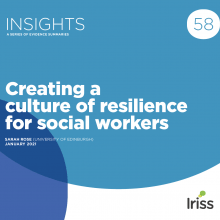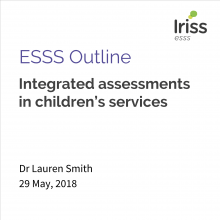Introduction
Social Work Scotland, Iriss and the Scottish Social Services Council (SSSC) have worked in partnership to draw together helpful resources for social service practitioners and their organisations to support them to think about and promote wellbeing and resilience.
Why is resilience important?
Working in social services is highly rewarding but can, at times, be stressful. So it's important that workers and their employers reflect on what promotes resilience and helps people to thrive. Put simply, resilience relates to an individual's capacity to manage and come back from demanding and high pressure situations.
The good news is there is a growing body of evidence and research that shows there are steps individuals, and the organisations where they work, can take to develop resilience. Resilience is not a trait that people either have or don't have. It involves behaviours, thoughts and actions anyone can learn and develop (Fox, et al, 2014). Workers and organisations can take positive steps to develop resilience and this resource signposts them to information and tools that help the process of developing resilience.
Beddoe et al. (2013, p. 102), indicate that resilience is supported by:
- factors that reside within individuals
- factors that reside in the organisational context
- factors linked with the educational preparation of practitioners
Luthar (2006) states that while many individual and organisational factors contribute to resilience; the single most important factor is quality of relationships. To develop resilience, therefore, workers need organisations that support the quality of relationships through supervision and other processes. We have selected resources we think will help with this.
The leadership capability of both managers and workers will also contribute to the development of resilience at a personal and organisational level. The Enabling Leadership research (SSSC, 2016) highlights a leadership logic model which illustrates what good leadership in Scotland's social services looks like and what contributes to this. It identifies resilience as a trait of good leaders.
In the Continuous Learning Framework for social service workers (SSSC and Iriss, 2008) there is a specific focus on the development of resilience in the personal capabilities. The framework defines resilience as 'persisting in pursuing goals despite obstacles and setbacks'. You may want to reflect on this personal capability when thinking about your resilience and aspects you need to develop further.
Who is this resource for?
This resource brings together a number of articles, pieces of practice wisdom, guidance, tools and case examples resources we think workers will find helpful when thinking about how they develop resilience. It is not a tool or framework but freely available information for workers and organisations. We have grouped resources under themes with a short introduction outlining why they are important for resilience.
Individuals or teams can use this resource to promote a better understanding of how to develop resilience. You don't have to use it in any particular order or way; choose resources that best suit your personal or organisational need.
If you want a more structured introduction to developing resilience, the Open University has produced a free online course. It supports the development of resilience in social work but is useful for workers across social services. It guides workers through concepts such as emotional resilience and steps to taking a positive approach to practice problems.
Supervision, support, coaching and mentoring
Supervision, and the relationship between a worker and supervisor, play a key role in the development of resilience. Other ways of supporting personal and professional development such as coaching and mentoring also help. In using these methods of development, it is important to consider how a person's attitude or mindset contributes to their personal resilience.
The SSSC's Supervision Learning Resource (2017) draws on Adamson et al (2014) who argue that:
effective supervision helps foster resilience and reduces the risk of burn out. It offers a space for dialogue and critical reflection, recognising social service staff are sometimes involved in situations which can be difficult and distressing. When strong emotions are raised in the worker as a result of practice it can be hard to keep a balanced perspective and exercise sound judgement. You can use supervision to make sure risks are carefully considered and best possible decisions reached.
There are a range of resources which support workers and managers to use supervision, coaching and mentoring effectively, some of them listed here.
- Leading change in supervision: messages from practice (Iriss, 2015)
- SSSC Supervision Learning Resource available on the Step into Leadership website
- SSSC Mentoring Guidance available on the Step into Leadership website
- SSSC Coaching Guidance available on the Step into Leadership website
- CLF organisational capabilities which support the development of organisational learning cultures
- ACOSVO Leadership Exchanges
- Martin Kettle, Achieving effective supervision
- Watch a talk by Professor Gillian Ruch (University of Sussex) about the organisational, context promoting relationship based practice and a resilient workforce.
- SCIE has also produced a range of resources to support supervision in a variety of settings, including supervision within integrated settings.
- CIPD Podcast 110 Resilience: Explores the idea of resilience and why it is fundamental to the success of both individuals and organisations, helping them to adapt to change and bounce back from adversity
- CIPD Podcast 122 Behavioural Science: Explore how learning from behavioural science can be applied in your organisation to help improve communication, learning and leadership
- CIPD Effective Leadership: It's all in the mind - this article explores how neuroscience concepts can help leaders develop more effective patterns of thinking and action. It looks at 'two of the misunderstood cognitive habits': mindfulness and 'mentalising' (paying close attention to what other people are thinking and likely to do next)
- CIPD Developing Resilience guide: An evidence-based guide for practitioners
Self-care, wellbeing and mindfulness
Taking active steps to maintaining good mental and physical health can help navigate the challenges in an often busy and pressured working environment. This section lists resources that focus on what we can do ourselves to strengthen our resilience and pay attention to our own relaxation and self-care needs.
- Mindfulness Based Approaches: An app created by Greater Glasgow Health Board detailing mindfulness based approaches, and includes access to national guidelines
- 10 lessons in self-care for social workers: Article by Deborah Lisansky Beck, in The Social Worker, on reducing stress and fostering relaxation, healing, and resilience through mindfulness
- Self-care for social workers: how mindfulness can help: Guardian article by Abigail Bryning, Social worker in East Sussex, on her experience of taking part in mindfulness training at work
- CIPD Wellbeing at Work fact sheet
Examples from practice
Here are some examples which illustrate how organisations are supporting the development of resilience.
West Lothian Council: Mindfulness in Practice
An interview with Sandra Gyaltsen and Jane Kellock of West Lothian Council on the subject of mindfulness and its application to social service practice.
East Ayrshire Council: Why is mindfulness important?
In East Ayrshire, the Chief Social Work Officer Development Programme has focused on developing the resilience of the workforce by developing and promoting a new professional Supervision Framework, based on adult learning principles, and has created opportunities for staff to access mindfulness training. This has led to practitioners recognising the benefits for themselves, and implementing this in their practice with others. A number of staff have also pursued training to be trainers.
We want to hear from you
We are very keen to add more examples of practice so if you'd like to share your story let us know by contacting admin@socialworkscotland.org
It could relate to how you're supporting the development of resilience at an individual, team or organisation level. Don't worry if it isn't ready to publish as we should be able to help you capture your story to share with others.
References
- Adamson, C, Beddoe, L, Davys, A (2014) Building Resilient Practitioners: Definitions and Practitioner Understandings, British Journal of Social Work, 44 (3), 522-541
- Beddoe, L., Davys, A. and Adamson, C. (2013) 'Educating resilient practitioners', Social Work Education, vol. 32, no. 1, pp. 100–117
- Fox, J, Leech, J and Roberts, E (2014), Supporting Emotional Resilience within Social workers, Research into Practice: Dartington
- Luthar, SS (2006) Resilience in Development: A synthesis of research across five decades in Cicchetti D and Cohen DJ (eds) Development Psychopathology: Risk, disorder, and adaptation (3) 2nd ed pp 739-795. John Wiley: Hoboken








